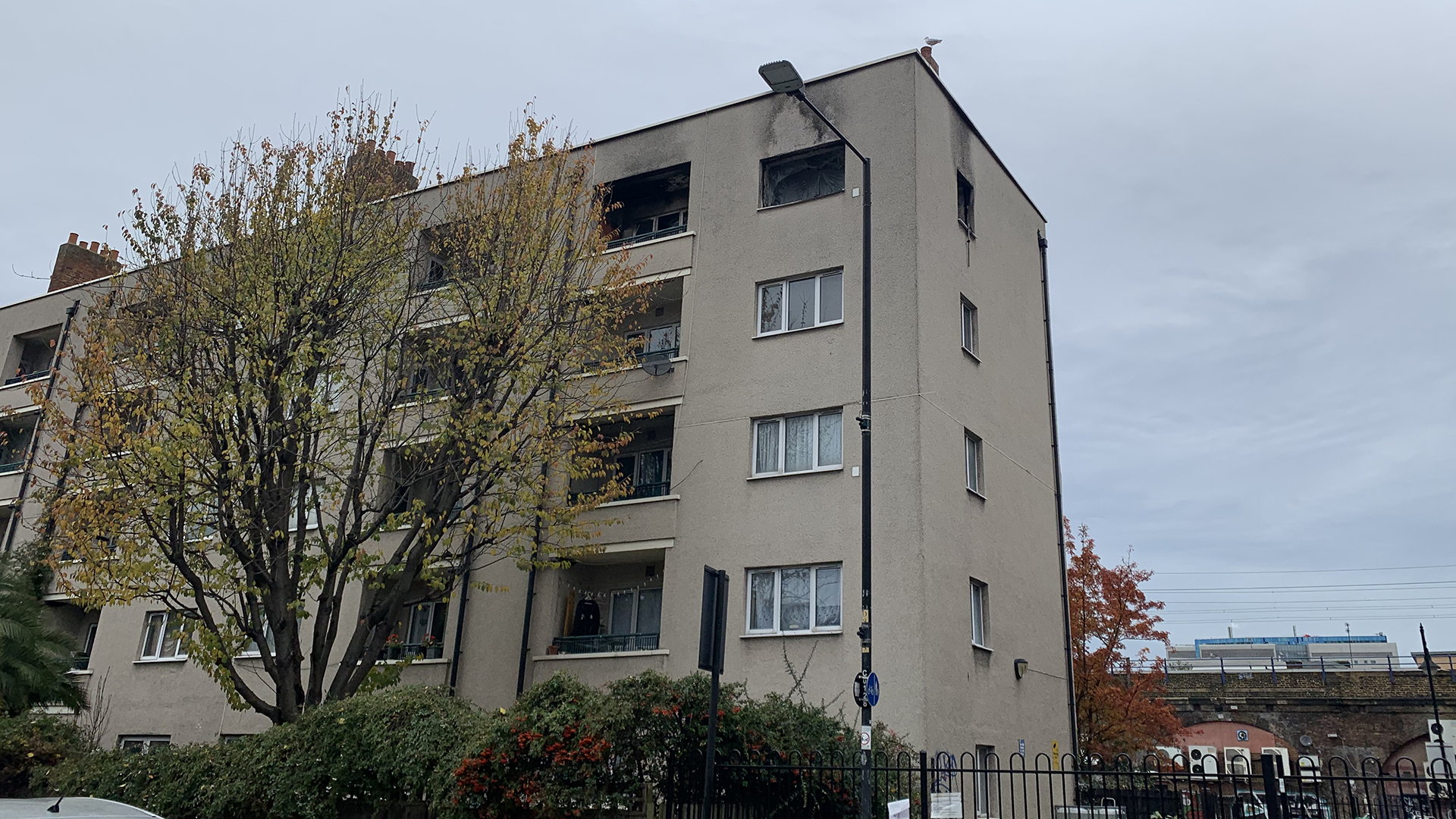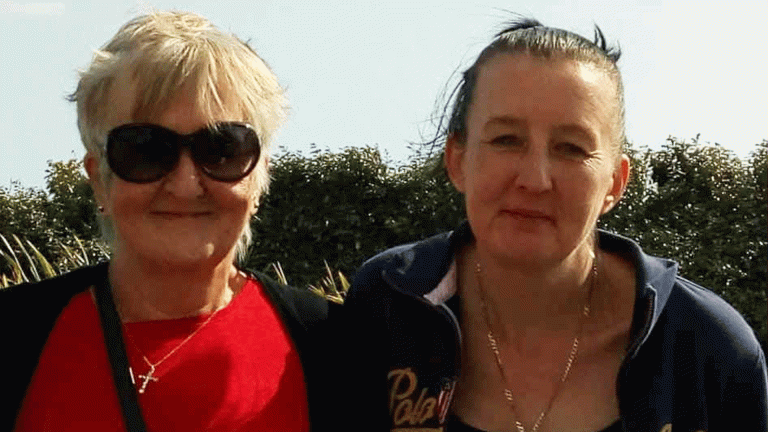But complaining was difficult. “Some people were scared of her sons [who used to come to the property with her]. We were scared we would never get back the deposit that we gave them.”
Some Maddocks House residents had paid £500 in advance – for tenants doing low-paid, insecure work like delivery driving this was an enormous sum of money.
On 5 March, Shahadat was asleep when he heard a noise “like sparklers or firecrackers”.
“It was just beneath my bed, so I leaned down and I saw little sparks coming from the battery [of another resident’s delivery bike],” he says. “I started shouting and one of the guys put a blanket on top of the battery and put it in the middle of the room.” Another tried to fill a bucket of water to douse it, but the water pressure was incredibly low.
Suddenly smoke started to pour out of the battery. “In seconds the whole room was covered in smoke,” says Shahadat. The residents ran outside and phoned the fire brigade. Shahadat recalls: “I thought everyone was outside, and we were just watching the fire. I was barefoot. I didn’t have my wallet with me, or my glasses.”
The fire ripped out of the window. Suddenly a man standing next to him collapsed to the ground crying. He had realised not everyone was out. Mizanur Rahman – a 41-year-old father of two – was still in the building. He would not leave it alive.
Advertising helps fund Big Issue’s mission to end poverty
Maddocks House, where Shahadat, Rahman and the others had been living, is part of the Tarling West Estate. The estate is council housing, owned by Tower Hamlets Council and managed for the last couple of decades by its ‘arm’s length management organisation’, Tower Hamlets Homes (THH).
Council housing like this was built specifically to alleviate the kind of overcrowded housing that Shahadat and his flatmates endured, and end the grip of slum landlords. But Margaret Thatcher’s Right to Buy policy, introduced in 1980, allowed residents of council housing to buy their flats at a discount. As the years have gone by these flats have found their way into the hands of private landlords. Recent studies suggest about 40% of flats sold under Right to Buy are now rented privately.
18 Maddocks House – where the fire happened – is no exception. Land registry records show it was purchased by Begum in 2005 for £107,000. The documents do not make clear whether or not she purchased it under Right to Buy, but the freeholder of the block is Tower Hamlets Council, and the property certainly was council housing when it was built.
Anthony Iles, chair of the Tarling West Tenants and Residents Association, has learned that flyers were being distributed around Whitechapel written in Sylheti or Bengali, advertising spaces at the flat. Fixers in the Bangladeshi community were also sending potential tenants to Maddocks House. The flat had – effectively – become an informal hostel.
Other residents on the estate had become concerned that something was going on in 18 Maddocks House before the fire. They saw the landlady arriving with her giant saucepans of food every evening. The caretaker found cigarette butts in the communal areas, and men praying or drying clothes.
On 3 August 2021 the council’s environmental health team had accessed the property with a warrant, found it to be overcrowded and issued a notice to the landlord, which gives 18 months to reduce the overcrowding to acceptable levels. In September 2021, the landlords applied to Tower Hamlets for a licence to run a ‘house in multiple occupation’ (HMO). The licence requires the landlord to ensure the house “is suitable for the number of occupants”.
Advertising helps fund Big Issue’s mission to end poverty
Breaching this licence is a criminal offence but – critically – the council has no legal power to refuse an application, unless the applicant has prior criminal convictions. Further complaints were made to the council, which have been meticulously documented by the Tarling West Tenants and Residents Association. They show that in November 2021 the resident of the flat below complained about water seeping through from 18 Maddocks House. The property was visited by the council’s contractor Mears, but the problems continued. In February 2022, a further call was made about the leak and the overcrowding of the flat.
A stage one complaint was submitted in June 2022, with the flat inspected by THH. In August 2022, the council approved the licence, allowing three people from two households to live in the flat. Any more than that was now a breach of the conditions – punishable by law. On 18 November, a director at the council wrote to say that the LFB visit had flagged that the flat “was not in a good condition with multiple people living in it”.
But it was not enough to save Shahadat and his flatmates from the deadly risk of fire. And the fire was by no means the end of their struggle.
After the fire Shahadat and his flatmates had nowhere to go. They took shelter in Shadwell station, and were initially told by Tower Hamlets Council officers that they had no recourse to public funds, and were ineligible for any help. They spent their first night sleeping in a local mosque.
Eventually, pressure from campaigners and media attention paid off, and the council offered them hotel accommodation until the end of Ramadan.
But after this point, their journey has been rocky. Some found brief respite at a squatted winter shelter. Nine were housed for a prolonged period by St George-in-the-East, an Anglican church in Shadwell.
Advertising helps fund Big Issue’s mission to end poverty
Most have now moved on, spread around Tower Hamlets, Newham and Croydon, some in housing conditions not much better than the flat they were burned out of. Shahadat now has a room to himself in Croydon.
“Even if I was sharing with another person, it would still be so much better than being stuck in a two- bedroom house which was more crowded than a prison,” he says.
As for Begum and her husband Aminur Rahman, they were charged by Tower Hamlets Council with several offences relating to breaches of their HMO licence. On 28 November at Thames Magistrates Court, Begum pled guilty to six charges and Rahman to three.
They will be sentenced at Snaresbrook Crown Court on 3 January, when Tower Hamlets Council will attempt to secure a confiscation order under the Proceeds of Crime Act. It’s likely that they were paid around £100,000 a year in rent – much of it in cash.
But the case raises worrying issues. Tower Hamlets is the most densely populated area in England. With social housing in short supply, these conditions are perfect for opportunistic landlords to exploit. The story here is bigger than one flat in Shadwell. It is about how we have allowed the worst housing stories of the past to re-emerge. East London’s council housing was supposed to mark the end of slum landlords like these. Instead, it has been allowed to become the making of them.
Will you sign our petition to End Housing Insecurity Now?
Advertising helps fund Big Issue’s mission to end poverty
Peter Apps is the author of Orwell Prize-winning Show Me The Bodies: How We Let Grenfell Happen
This article is taken from The Big Issue magazine, which exists to give homeless, long-term unemployed and marginalised people the opportunity to earn an income. To support our work buy a copy!
If you cannot reach your local vendor, you can still click HERE to subscribe to The Big Issue or give a gift subscription. You can also purchase one-off issues from The Big Issue Shop or The Big Issue app, available now from the App Store or Google Play









